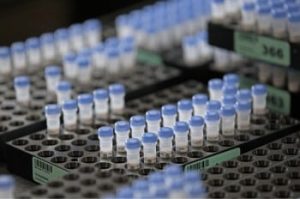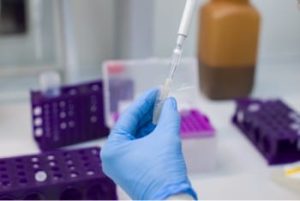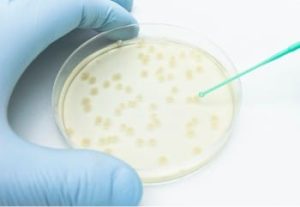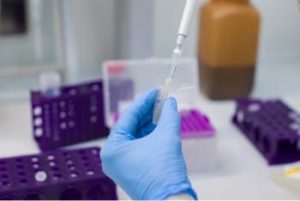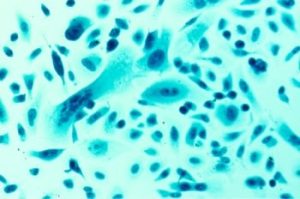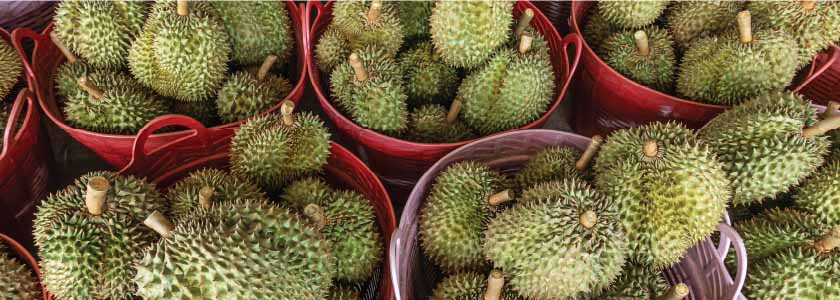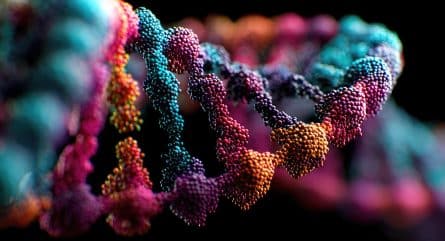It’s tough being a durian. Or, at least, a durian fan.
What is Durian Fruit?
High in vitamins B1, B6, and C, and packing a serious health boost for people looking for foods with a lot of fiber, iron, and potassium, the large (up to 7 pounds) spike-covered fruit is a native to southeast Asia, where you’ll commonly find it as a key ingredient in candy, biscuits, ice cream, milkshakes, and even cappuccino. It sometimes winds up in curries, can be eaten with rice, and every once in a while is cooked like a vegetable.
Cut open, the fruit nestled within the durian shell has an unusual appearance, almost like a peach-colored human liver cradled within a spike-riddled football helmet. But it’s the smell that really sets the durian apar
“The smell evokes reactions from deep appreciation to intense disgust, and has been described variously as rotten onions, turpentine, and raw sewage,” states Wikipedia. “Vomit-flavoured custard,” offers The Rough Guide to Malaysia, Singapore & Brunei. “Your breath will smell as if you’d been French-kissing your dead grandmother,” suggested the late Anthony Bourdain. “Like eating raspberry blancmange in the lavatory,” wrote Anthony Burgess.
And it’s not just that it smells, um, “bad.” The smell has actually proven dangerous. All over Asia, signs proclaim the prohibition of the durian fruit and announce hefty fines, and it’s actually illegal to carry one on public transportation in places like Singapore and Hong Kong. The overpowering smell of a durian grounded a flight in Indonesia, prompted pilots to don oxygen masks and make an emergency landing in Canada, caused the clearance of a dorm in Australia after residents thought there was a gas leak, and last summer forced the evacuation of a post office in Germany and sent six people to the hospital.
Why does durian smell?
Turns out, durian stinks because of it’s genetics. As pointed out in a 2017 study published in Nature Genetics, one particularly odorous type of durian, the Musang King, which hails from Malaysia, has 46,000 genes in its full sequence and traces its heritage back some 65 million years to the cacao plant.
In the study, scientists found that genes involved in regulating sulphur pathways were more active in the Musang King than they were in less-smelly durians, and that they are only active when the fruit is ripe
“The researchers think this boost in activity was linked with another gene they found called ACS, which regulates the production of ethylene, a plant hormone involved in ripening,” wrote the Australian Broadcasting Corporation.
That gene, researchers also found, is expressed not only in the durian fruit but also in the leaves and root stems.
“Our analysis also suggests a potential association between MGL and ACS in the durian fruit, whose coordination may involve the Yang cycle,” researchers wrote, using the abbreviations for two enzymes. “Previous durian studies have also noted correlations between VSC production and increased ethylene production; however, a genetic link behind these observations has not been demonstrated.”
So, why would durian fruit develop such a smell? It’s an attractant, the study hypothesized.
“Durian—by emanating an extremely pungent odor at ripening—appears to have the characteristic of a plant whose main dispersal vectors are odor-enticed primates rather than visually enticed animals,” the report stated.
The study of durians is likely not over yet. The authors of the Nature Genetics report that the fruit’s rapid commercialization has led to a number of cultivars which vary widely in pricing but whose authenticity is rarely verified; a high-quality genome assembly could identify cultivar-specific traits and allow molecular barcoding for quick quality control. Further, The Guardian noted, several species are considered endangered or vulnerable, and knowing more about their DNA may help in protection efforts.
Is Durian Hard to Grow?
Intrigued? It’s hard to find durian outside of Southeast Asia (e.g., Singapore, Thailand, Philippines, Laos, Vietnam, Cambodia, Myanmar, Malaysia) though if you live in tropical regions, or have a tall-roofed year-round greenhouse, you may have luck growing durian.
- Find a plot with full sunlight
- Fertilize the soil with compost, plant seeds, and never let the temperature drop below 70 degrees F.
- Durian fruit can be harvested when the plant is four to five years old.

